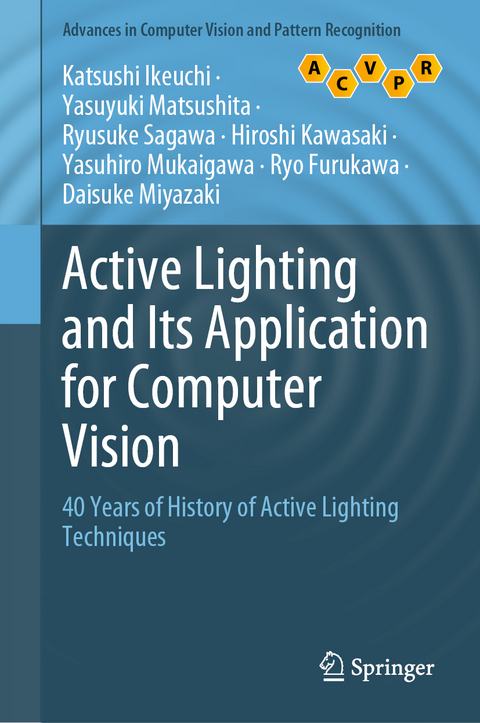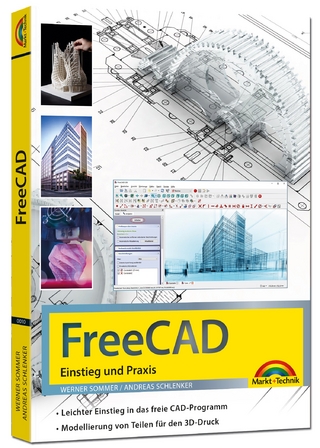
Active Lighting and Its Application for Computer Vision
Springer International Publishing (Verlag)
978-3-030-56576-3 (ISBN)
This book describes active illumination techniques in computer vision. We can classify computer vision techniques into two classes: passive and active techniques. Passive techniques observe the scene statically and analyse it as is. Active techniques give the scene some actions and try to facilitate the analysis. In particular, active illumination techniques project specific light, for which the characteristics are known beforehand, to a target scene to enable stable and accurate analysis of the scene.
Traditional passive techniques have a fundamental limitation. The external world surrounding us is three-dimensional; the image projected on a retina or an imaging device is two-dimensional. That is, reduction of one dimension has occurred. Active illumination techniques compensate for the dimensional reduction by actively controlling the illumination. The demand for reliable vision sensors is rapidly increasing in many application areas, such as robotics and medical image analysis. This book explains this new endeavour to explore the augmentation of reduced dimensions in computer vision.This book consists of three parts: basic concepts, techniques, and applications. The first part explains the basic concepts for understanding active illumination techniques. In particular, the basic concepts of optics are explained so that researchers and engineers outside the field can understand the later chapters. The second part explains currently available active illumination techniques, covering many techniques developed by the authors. The final part shows how such active illumination techniques can be applied to various domains, describing the issue to be overcome by active illumination techniques and the advantages of using these techniques. This book is primarily aimed at 4th year undergraduate and 1st year graduate students, and will also help engineers from fields beyond computer vision to use active illumination techniques. Additionally, the book is suitable as course material for technical seminars.Dr. Katsushi Ikeuchi is a Principal Researcher at Microsoft Research Asia, Beijing, China, and an Emeritus Professor of the University of Tokyo, Japan. Dr. Hiroshi Kawasaki is a Professor in the Department of Advanced Information Technology and Head of the Computer Vision and Graphics Laboratory at Kyushu University, Fukuoka, Japan. Dr. Yasuhiro Mukaigawa is a Professor in the Division of Information Science and Head of the Optical Media Interference Laboratory at Nara Institute of Science and Technology (NAIST), Ikoma, Japan. Dr. Ryusuke Sagawa is a Senior Researcher in the Interactive Robotics Research Group of the Intelligent Systems Research Institute at the National Institute of Advanced Industrial Science and Technology (AIST), Tsukuba, Japan Dr. Ryo Furukawa and Dr. Daisuke Miyazaki are Associate Professors in the Image Media Engineering and Computer Graphics Laboratory of the Department of Intelligent Systems at Hiroshima City University, Japan. Dr. Yasuyuki Matsushita is a Professor in the Information Science and Technology Department at Osaka University, Japan, where he leads a laboratory focusing on computer vision, machine learning, data mining, information and knowledge processing, and their applications in human-computer interaction.
Part I: Basics and Theory
Photometry
Geometry
Sensors
Light Sources
Part II: Algorithms
Photometric stereo
Structured light
Other shape reconstruction techniques
Photometric estimation
Part III: Applications
Visualization, Augmented Reality, Virtual Reality, and Mixed Reality Systems
Biomedical Applications
E-Heritage
Robot Vision, Autonomous Vehicles, and Humans
| Erscheinungsdatum | 10.09.2020 |
|---|---|
| Reihe/Serie | Advances in Computer Vision and Pattern Recognition |
| Zusatzinfo | XIV, 308 p. 251 illus., 167 illus. in color. |
| Verlagsort | Cham |
| Sprache | englisch |
| Maße | 155 x 235 mm |
| Gewicht | 653 g |
| Themenwelt | Informatik ► Grafik / Design ► Digitale Bildverarbeitung |
| Informatik ► Theorie / Studium ► Künstliche Intelligenz / Robotik | |
| Mathematik / Informatik ► Mathematik ► Graphentheorie | |
| Schlagworte | photometric stereo • Photometry • Physics-based Vision • polarization • Projector and Camera System • Structured Light • surface reflectance • Time of Flight |
| ISBN-10 | 3-030-56576-9 / 3030565769 |
| ISBN-13 | 978-3-030-56576-3 / 9783030565763 |
| Zustand | Neuware |
| Haben Sie eine Frage zum Produkt? |
aus dem Bereich


